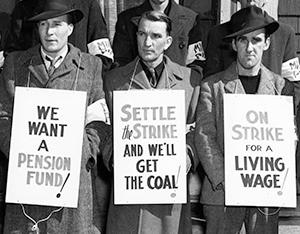
Written in 1929, this is a Cape Breton workers’ song that protests the importation of non-unionized, surplus labour from Newfoundland during the summer months. They were imported to meet seasonal demands or to fill the gap left by striking workers. These individuals became the target for contempt and ridicule by the local workforce. Although cited as the ‘national anthem’ of Cape Breton workers by both Stuart McCawley and Alphonse MacDonald, this song is rarely sung in Cape Breton today.
This field recording was collected by Ronnie MacEachern in 1978.
The Honest Working Man, 1978. Charlie MacKinnon. T-1067. Beaton Institute, Cape Breton University.
Artist
Charlie MacKinnon
Charlie MacKinnon was born in Little Bras d’Or. He was exposed to traditional Scottish music and dancing in his early years; his father enjoyed played Scottish tunes on the violin and his uncles liked to stepdance and sing traditional Scottish songs. At age 10, he started playing guitar and became interested in music by country musicians such as Hank Snow, Wilf Carter and Jimmy Rodgers. When he was 15, he began to write his own folk songs.
Years later, he would meet Lillian Crewe Walsh, a poet from Glace Bay. Walsh suggested that MacKinnon write music for some of her poems. He chose to write the music for six poems, which he recorded along with some of his own material. His first single The Ghost of Bras d’Or was released around 1948. The song became a hit across Canada and a Canadian country standard.
Instead of focusing on touring and developing his music career, MacKinnon kept his job at the Sydney Steel Plant but he continued to perform songs on CJCB Radio and played shows in Newfoundland, Boston and Toronto. He was also invited to play at the Newport Folk Festival by Pete Seeger.
As a result of his music accomplishments and his great songwriting abilities, Charlie MacKinnon will always be praised as a great local “folk balladeer and storyteller.”1
1. MacGillivary, Allister. 1985. Cape Breton Song Collection. Sydney: Sea Cape Music, Ltd.
Lyrics
The Honest Working Man
Collected by Ron MacEachern from the singing of Charlie MacKinnon
Tune: “The Hills of Mullabawn”
© From the collection of Ron MacEachern.
Chorus:
‘Way down in east Cape Breton, where they knit the socks and mittens,
Highlanders represented by the dusty, black and tan.
May they never be rejected, and home rule be protected
And always be connected with the honest working man.
1. I think I will meander with my friend the Newfoundlander;
He is the finest fellow that ever graced this land.
His name it is Dan Alex, and he can talk the Gaelic
We work down in the coal mine with the honest working men.
2. When the leaves fall in the autumn and fish freeze to the bottom,
They take a ten-ton schooner and go ’round the western shore.
They load her with provisions, hard tack and codfish mizzens,
The likes you’ve never heard of since the downfall of Bras d’Or.
3. We cross the Bay of Fundy, we arrive there on a Monday:
Have you seen my brother Angus? Oh please tell me if you can.
He was a CNR box greaseman, but now he’s a policeman,
And he now earns his living like an honest working man.
4. The man who mixes mortar gets a dollar and a quarter,
The sugar factory worker, he gets a dollar ten,
While there’s my next-door neighbour who lives on just his labour,
And in the winter doesn’t earn enough to feed a sickly hen.
Repeat Chorus